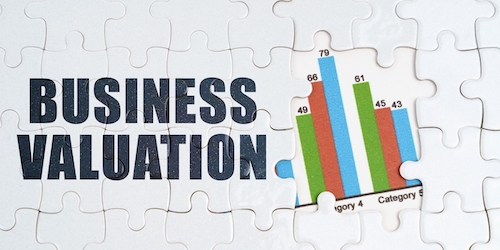Whether you are thinking about selling your business in the near, medium or long term, knowing the value of your business and the factors that impact value are important to know. The problem is most business owners have no idea what their business is worth and the metrics that determine value.
In this article, we discuss precisely why a business valuation is important, what is included, and who needs one.

What is a Business Valuation?
A business valuation is an assessment of your company’s worth. There are different types of business valuation methods, including a market approach, asset approach, and income approach. For a market-based approach, in particular, a valuation determines how much a fair and reasonable buyer is willing to pay to acquire your company. In other words, it gives a range for which you can expect your company to sell.
What Does a Business Valuation Include?
A business valuation considers your free cash flow and the multiple of your cash flow that potential buyers are willing to pay.
Free Cash Flow (FCF)
Free cash flow (FCF) represents your sales revenue after operating expenses and taxes. This is very similar to your earnings before interest, taxes, depreciation, and amortization (EBITDA). Your business broker or advisor will determine your free cash flow based on your financial documents, such as your federal tax returns, profit and loss (P&L) statements, cash flow statements, and tangible and intangible asset lists.
The Multiple
The next step is determining what multiple buyers are willing to pay to acquire your company. This multiple depends on a variety of factors. However, before any adjustments are made (see below), your broker will consider the initial range size of adjusted cash flow.
In essence, the higher the adjusted cash flow amount the better. Here is a general overview of how it works and what you can expect when determining the multiple based on your free cash flow amount:

- Under $500K: 3x to 4x (valuation range $1m to $2m)
- $500K to $1m: 3x to 5x (valuation range $1.5m to $5m)
- $1m to $2.5m: 4x to 6x (valuation range $4m to $15m)
- $2.5m to $10m: 6x to 10x (valuation range $15m to $100m)
- $10m to $25m: 10x to 20x (valuation range $100m to $250m)
- $25m and up: 25x+ (valuation range $600m and up)
Secondary Considerations

There are a number of additional factors that may influence the multiple, such as:
Amount of New Construction
The less new construction you have the better. This is because they do not provide long-term reliability, unlike maintenance contracts (see below)
Ideally, your revenue from new construction should total less than 20% of your free cash flow.
Amount of Maintenance Contracts
Maintenance contracts offer a buyer assurance that the revenue will remain steady and predictable long term. Since they provide more financial certainty, businesses that produce more than 20% of their free cash flow from maintenance contracts are more valuable on average.
Revenue Growth
Are you growing or declining? If you are declining, why? These are questions that potential buyers will ask and will care about the answer. A company with year-over-year growth of 20% or higher are in a great position to sell for optimal value.
Marketing Reputation Management
Reviews matter. A buyer is more willing to purchase a company that has a pristine reputation within their community. The more Google reviews your business has the better, and the higher your average star rating is the better.
Lead Generation Program
Potential buyers will ask about your marketing efforts. A business with a proven lead generation program that produces consistent and predictable results is more valuable than a business with a high cost per acquisition and that inconsistently generates leads.
Size of Technician Crew
A technician crew of more than 10 is great.
If you have technicians that have been with you for an extended amount of time, then that is even better.
Internal Workflow Technology
How does your business operate? Are you using ServiceTitan or HouseCall Pro or do you have an alternative way for communicating with customers and collecting payment? The quality of your internal workflow can most certainly impact your business valuation.
Business Independent or Owner Involvement
If you were to go on vacation and turn your phone off, would the business still operate effectively and efficiently? If so, then this is an advantage and can increase the value of your company. On the other hand, heavy business owner involvement could negatively impact your value and/or lead to a need for more involvement during the sale transition.
The Importance of a Business Valuation:
5 Reasons You Need One Before You Sell
A business valuation offers important benefits, and it is necessary if you are selling your company. Notably, a professional business valuation allows you to:

1. Make Informed Exit Strategy Decisions
Whether you are nearing the age of retirement, want to pursue other business ventures, or simply want to spend more time with your family, you should receive a professional business valuation anytime you are contemplating selling your business.
Specifically, a business valuation provides the information you need to make informed decisions. If you receive the valuation that allows you to achieve your exit strategy goals, then you can proceed with the sale. If your valuation is lower than you desire, then you can take the necessary steps to improve your valuation.
2. Determine How to Improve Your Company’s Value
A valuation does more than simply provide you with an estimated value. Instead, a business valuation provides insights into what (if any) areas of your company need improvement. For example, if your value is negatively impacted by high employee turnover and a heavy ownership involvement, then you can take steps to ensure there are long-term employees in place to fulfill your role during the ownership transition, which can increase the amount buyers are willing to pay.
3. Avoid Selling for Less Than Your Business Is Worth
A valuation lets you know precisely how much potential buyers are likely to pay for your company. Otherwise, you risk selling for below your company’s worth as you are not able to explain why their offer is low and why you are asking for more.
Additionally, a business valuation helps prevent your business from sitting on the market for an extended period of time. A common mistake that sellers make is asking for too much, only to find out later that buyers are not willing to pay it and go through a long wait period before they inevitably lower their asking price.
In other words, if the fair market value for your business is more or less than you initially anticipate, then it is better to know sooner rather than later so that you can plan your exit strategy accordingly and avoid surprising offers during the sales process.
4. Justify Your Asking Price with Potential Buyers
The buyer’s primary goal is to secure the most favorable purchase price; your primary goal as the seller is to maximize the sale price. As you might imagine, both sides often start far from one another.
However, if you can justify your asking price with a professional valuation from a reputable and experienced business broker, you have more negotiation leverage. In most cases, sellers with an accurate business valuation are able to sell at or above their initial asking price.
5. Prevent Deals Falling Through During Due Diligence
Keep in mind, buyers will not blindly trust your valuation. They will want to know how you arrived at your asking price and the buyer will review your financial information during due diligence to confirm the negotiated purchase price is fair and based on accurate business data.
With that understanding, a professional business valuation helps prevent deals from falling through during negotiations, due diligence, and closing stages. This is because your business broker should calculate your valuation based on your financial performance (i.e. free cash flow) and reasonable adjustments to the acquisition multiple.
Who Needs a Business Valuation?
A business valuation is a prerequisite for selling your company. Therefore, if you are planning your exit strategy, you will need a professional valuation, which is used to set (and justify) your asking price.
With that said, we believe every small business owner should receive a business valuation to understand the worth of their company, regardless of whether they intend to sell in the near future. This is because a professional valuation provides insights that can help improve your company’s worth.
You may also need a business valuation for succession planning, estate and gift taxes, buy/sell agreements, and divorce purposes.
Contact Brentwood Growth for a
Complimentary Business Assessment
Are you contemplating your exit strategy? Brentwood Growth offers complimentary (no-obligation) business valuations to help you make more informed decisions.
Contact us today for more information and to receive your business valuation and assessment.
